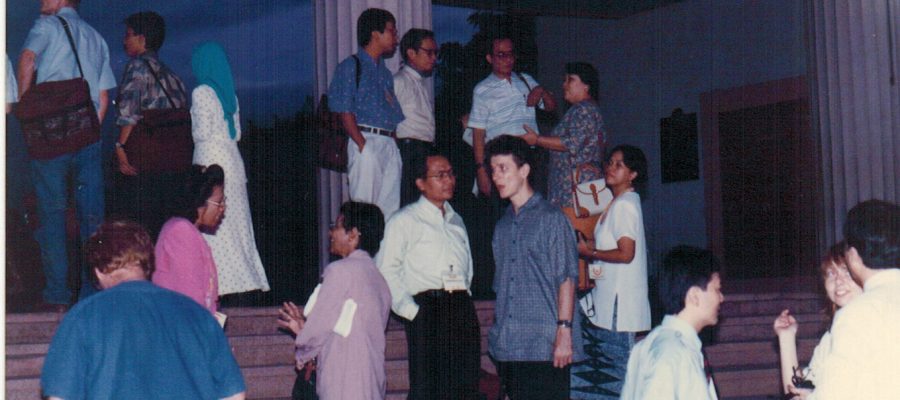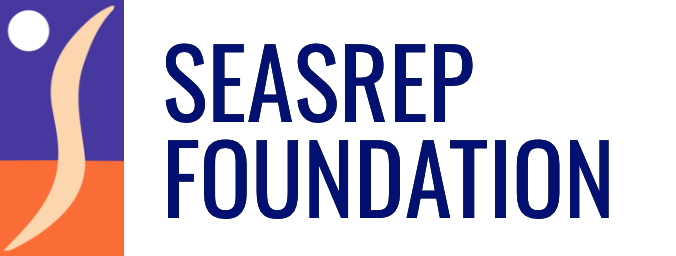1998
International Conference on Southeast Asia in the 20th Century
28-30 January 1998
University of the Philippines, Diliman, Quezon City

The International Conference on Southeast Asia in the 20th Century took place at the University of the Philippines Diliman, Quezon City on 28-30 January 1998. The conference sought to:
- Identify the forces and factors significant in shaping 20th century Southeast Asia as a whole and its various aspects;
- Examine the various forms — cultural, political, economic, etc. — into which Southeast Asian societies evolved in the century;
- Discuss Southeast Asian perspectives on the region’s transformation process; and
- Project the emergent trends, forces and features that will remain signicant in the next century.
Toward these objectives the conference tackled six major themes, which were presented by:
- Prof. Sida Sonsri, Thammasat University: Politics, the State and Civil Society in Southeast Asia
- Prof. Jomo K. Sundaram, Universiti Malaya: Can Tigers Become Dragons? Interrogating The Banks’ Gaze on the Region
- Prof. Wazir Karim, Universiti Sains Malaysia; What the 20th Century Has Meant to Southeast Asia: Culture as an Interpretation of Destiny
- Dr. Darunee Tantiwiramanond, Women’s Action and Research Initiative, Thailand: The Growth of Women’s Collective Efforts in Southeast Asia
- Dr. Roger Posadas, University of the Philippines: The Scientific and Technological Development of Southeast Asia in the 20th Century
- Dr. Reynaldo Ileto, Australian National University: Perspectives in the Study of Southeast Asia
In addition, twenty-nine (29) panel writers from various universities and research institutes in Southeast Asia discussed the sub-themes.
Panel 1: Economic Liberalization and Globalization
- Hassan Mohamed Aslam Gulam, University of Malaya, Trade Liberalization, Dependency and Trading Losses in Malaysia
- Jose Tongzon, National University of Singapore, Explaining ASEAN Economic Growth: Critical Factors
- Greg Felker, Hong Kong University of Science & Technology, The Political Premises of Economic Integration: Responses to Globalization in Malaysia and Thailand
- Chu Viet Cuong, Institute of Southeast Asian Studies of Vietnam, The Role of Foreign Direct Investment in Vietnam’s Economic Renovation and Its Cooperation with Other ASEAN Countries
Panel 2: Economic Liberalization and Globalization
- Surin Pookajorn, Silpakorn University, A Case Study of Pre-Neolithic to Modern Orang Asli in Southern Thailand
- Eusebio Dizon, University of the Philippines, Status of Philippine Archaeology in the 20th Century
- Adi Taha, Department of Museums and Antiquities (Malaysia), Archaeology in 20th Century Malaysia
- Wilhelm Solheim, Honolulu, Hawaii, International Organizations Dealing With SEA Prehistory
Panel 3: Perspectives of Southeast Asia
- Fernando Zialcita, Ateneo de Manila University, The Fiction Called “Asia,” The Reality Called “Southeast Asia”
- Nguyen Thuy Linh, University of Social and Human Sciences, New Changes in the Study of Vietnam and Other Southeast Asian Countries
- Raul Pertierra, University of New South Wales, The Philippine State and the State of Philippine Studies
Leakhena Nou, University of Hawaii in Manoa, Sociological Fieldwork Experience in the Kingdom of Cambodia - Charnvit Kasetsiri, Thammasat University, Southeast Asian Studies in Thailand
- Shaharil Talib, University of Malaya, Southeast Asia: For Your Eyes Only
Panel 4: Science, Technology and Industrial Policy and Strategy
- Mai Ha, Institute for Scientific Information (Hanoi), The Main Directions of Vietnam’s S & T Development Strategy to 2010
- Jose Magpantay, University of the Philippines, The Role of Science and Technology in Sustainable Development: Recommendations for the Philippines
- Dominicus Priyarsono, Bogor Agricultural University, A Comparative Study of Japanese-Indonesian Industrial Policies
- Yuliman Purwanto, Satya Wacana Christian University, Science and Technology Policy in Indonesia
Panel 5: Conflict Resolution
- Ramses Amer, Uppsala University, Expanding ASEAN’s Conflict Management Framework in Southeast Asia: The Border Dispute Dimension
- Arnold Azurin, University of the Philippines, A Way Out of the Sabah Sand Trap in RP-Malaysia Ties: Joint Development of the Border Zone Communities and Resources as an EAGA Priority Program
- Radziah Abdul Rahim, Universiti Utara Malaysia, ASEAN: Making Peace Work
Panel 6: Traditions, the Arts and Cultural Symbols
- Honey Libertine Achanzar, University of the Philippines Manila, Iron and the Concept of the Artisan’s Power in Southeast Asia
- Joycie Alegre, U.P. Tacloban College, The Kinasingkasing Sarswela: Transmutation of Traditional Life to Contemporary Theater
- Roland Tolentino, University of the Philippines, Archipelagic Space and Southeast Asian Cinemas
- Belen Calingacion, University of the Philippines, A Cross-Cultural Study of Filipino and Indonesian Interpersonal Communicative Style
- Ms. Dwi Woro Mastuti, University of Indonesia, Javanese Mythology and Its Role in the Study of Southeast Asia
Panel 7: Political Change and Processes
- John Brown, Nordic Institute of Asian Studies, Violence in Phnom Penh, the July 1997 Coup in Cambodia: Distintegration of Democracy or Continuation of Cambodian Politics by Other Means
- Muhadi Sugiono, Gadjah Mada University, Political Power of Ideas: Pro-Democracy Movements in Indonesia
Panel 8: Environmental Policy and Practice
- Lou de Leon-Bolinao, University of the Philippines, Environmental Policies of Post-War Philippine Presidents, 1946-1996
- Edgardo Martin, Manuel L. Quezon University, Quality Children’s TV Programming in the Philippines: Its Focus on Environmental Education in the 20th Century
- Azilah Kasim, Northern University of Malaysia, Market Segmentation as a Useful Tool Towards Achieving Sustainability in EcoTourism
Panel 9: Chinese in Southeast Asia
- Goda Miho, Independent Researcher (based in Singapore), Chinese Voluntary Associations, Education and Multiple Identities in Colonial Singapore
- Liu Hong, National University of Singapore, The Globalization of Ethnic Chinese Voluntary Associations in Southeast Asia: Dynamics, Functions and Implications
Panel 10: ASEAN and the World
- Eero Palmujoki, University of Tampere, EU-ASEAN Relations: Reconciling Two Different Agendas
- Leif Peter Niklas Swanstrom, Uppsala University, Will China Be a Threat to or a Partner of Southeast Asia in the 20th Century?
Panel 11: Religion and Society
- Gerardo Lanuza, University of the Philippines, A Prolegomenon to a Filipino Sociology of Religion
- Mathias Diederich, University of the Philippines Diliman (now with Goethe University), The Ongoing Discussion on Indonesian Islam and Its Impact in the Society
- Carmen Abubakar, University of the Philippines, Tausug Political Culture
Panel 12: Gender and Socio-Political Issues
- Sinith Sittirak, Thammasat University, Daughters of Development: The Stories of Women and the Changing Environment in Thailand
- Teh Yik Koon, Universiti Utara Malaysia, Crimes Against Women in Malaysia
- Ha Thi Thu Huong, National University of Singapore, Vietnamese Women and Leadership in the 20th Century: Prospects for Vietnamese Women Leaders in the 21st Century
- Mina Roces, Central Queensland University, The Gendering of Philippine Post-War Politics
Panel 13: Gender and the Arts
- Catherine Diamond, Soochow University, Women Warrior’s of the Stage: Vietnam’s Female Playwrights and Directors
- Ooi Eng Lye, University Science of Malaysia, Silences of Malay Women: Subtle Resistance and Protest in a Malay Patriarchal Society as Depicted in Shahnon Ahmad’s Recent Novels of the 80s and 90s
- I Made Suparta, Universitas Indonesia, Exploitation and Images of Women in Balinese Traditional Performing Arts
- Thelma Kintanar, University of the Philippines, Gender and Discourse in Indonesian Women’s Poetry
Panel 14: Nation-State Formation
- Stein Tonnesson, University of Oslo, Ho Chi Minh’s First Constitution (1946)
- Ji Ungpakorn, Chulalongkorn University, Three Stages in the Development of the Thai Capitalist State
- Seung Woo Park, Yeungnam University, The State and Classes in South Korea and the Philippines; Milagros Guerrero, University of the Philippines, Historians’ Ideas of the Nation-State and the Philippine Revolution, 1900-47
Panel 15: Urbanization Issues
- Ahmad Munawar, Gadjah Mada University, Traffic Management Strategies for Urban Areas in Southeast Asia
- Goh Beng Lan, Universiti Sains Malaysia, Rethinking Malaysian Modernity: An Enquiry Into Power, Cultural Production and the Cityscape in Contemporary Urban Penang, Malaysia
- Namiko Minai, Tokyo Metropolitan University, Paradigm for Upgrading Urban Poor Communities in Southeast Asian Cities: Case of CMP in Manila
- Usman Pelly, North Sumatra University, The Role of Social Institutions in a Plural Society: A Case Study of Medan City
Panel 16: Politics and Civil Society Dynamics
- Hans Antlov, Gothenburg University, Democracy in Asia: The View from Afar
- Olle Tornquist, University of Oslo, Making Democratization Work
- Bridget Welsh, Hofstra University,Taxing Malaysia: Strategic Alliances between the State and the Business Community
- Agustinus Prasetyantoko, Gadjah Mada University, Political Attitudes of Young Indonesian Professionals
Panel 17: Education
- Sorn Samnang, Royal University of Phnom Penh Impact of French Culture in the Evolution of Education in Cambodia, 1863-1975
- Lina Van Heugten, University of the Philippines, American Values Reflected in Philippine Textbooks, 1901-1932
- Annis Raksanagara, Bogor Institute of Agriculture, Education Development in Indonesia: Improving Quality and Quantity of Educated People
Panel 18: Rural Communities
- Sorn Samnang, Royal University of Phnom Penh Impact of French Culture in the Evolution of Education in Cambodia, 1863-1975
- Lina Van Heugten, University of the Philippines, American Values Reflected in Philippine Textbooks, 1901-1932
- Annis Raksanagara, Bogor Institute of Agriculture, Education Development in Indonesia: Improving Quality and Quantity of Educated People

